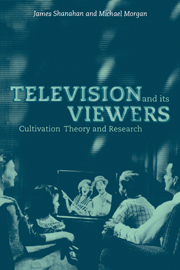Book contents
- Frontmatter
- Contents
- List of figures
- List of tables
- Foreword by George Gerbner
- 1 Origins
- 2 Methods of Cultivation: Assumptions and Rationale
- 3 Methods of Cultivation and Early Empirical Work
- 4 Criticisms
- 5 Advancements in Cultivation Research
- 6 The Bigger Picture
- 7 Mediation, Mainstreaming and Social Change
- 8 How does Cultivation “Work,” Anyway?
- 9 Cultivation and the New Media
- 10 Test Pattern
- Methodological Appendix
- References
- Index
5 - Advancements in Cultivation Research
Published online by Cambridge University Press: 22 September 2009
- Frontmatter
- Contents
- List of figures
- List of tables
- Foreword by George Gerbner
- 1 Origins
- 2 Methods of Cultivation: Assumptions and Rationale
- 3 Methods of Cultivation and Early Empirical Work
- 4 Criticisms
- 5 Advancements in Cultivation Research
- 6 The Bigger Picture
- 7 Mediation, Mainstreaming and Social Change
- 8 How does Cultivation “Work,” Anyway?
- 9 Cultivation and the New Media
- 10 Test Pattern
- Methodological Appendix
- References
- Index
Summary
In this chapter we look at work that advanced cultivation beyond the initial volley of studies and critiques described in Chapter 4. We begin with some further historical recounting of the milestone studies that contributed to the important theoretical advancements. Primarily we examine two ways in which cultivation theory was pushed ahead: (1) through development of the concept of “mainstreaming” (briefly discussed in the previous chapter) and (2) through the expansion of the range of topics which cultivation examined.
Advancing Cultivation
One can look at early Cultural Indicators and cultivation research (from 1967 to roughly about 1980) as the statement of a theme, followed by a critical response. The “theme” was the profferment of a hypothesis: that the nature and contours of the symbolic cultural environment – and the amount of time we spend living in it and absorbing its messages and lessons – have a relationship to how we think about the world. Attendant to the statement of this thesis was the political and critical argument that mass media institutions, especially television, were playing something less than the freedom-protecting role that a democratic society perhaps optimistically envisions.
One response to this statement, as seen in the previous chapter, was that cultivation couldn't be properly measured and therefore was probably not real; or, if real, it had not been convincingly demonstrated using sufficiently rigorous scientific techniques.
- Type
- Chapter
- Information
- Television and its ViewersCultivation Theory and Research, pp. 81 - 106Publisher: Cambridge University PressPrint publication year: 1999



